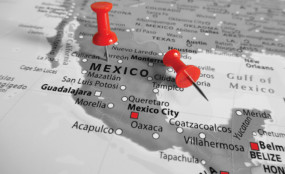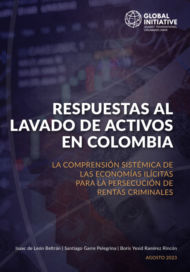The mandate of Guatemala’s International Commission Against Impunity (CICIG from the Spanish) came to an end on 3 September. The commission, an independent that investigated organized crime and corruption, had operated in Guatemala since 2007. When it brought investigations against President Jimmy Morales, he accused it of overreach and refused to renew its mandate. The final report of the CICIG reveals details of extensive state capture and leaves a dark warning of the consequences.
On Thursday 16 April 2015, media outlets in Guatemala announced something out of the ordinary: the police and the Ministerio Público (Public Ministry), backed by the CICIG, ordered the arrests of several high-ranking public officials for their involvement in a customs and tax corruption case known as La Línea. Even the then president, Otto Pérez Molina, and vice-president, Roxana Baldetti, were implicated and faced arrest. On the same day, Attorney General Thelma Aldana and the CICIG commissioner, Ivan Velasquez, gave a press conference to inform the public of what was happening.
What was most surprising was not the exposure of the network, but that a government ministry had identified it and named suspects from the highest spheres of government, ordering their arrest. For Guatemala, this was unprecedented, as was the transparency surrounding the events. That day became named ‘CICIG Thursday’ – and on subsequent Thursdays, more cases would see the light of day thanks to the commission.
In 2013, under Commissioner Velasquez, the CICIG had begun working with the Public Ministry and Guatemala’s judiciary in a way that was simply unlike previous commissioners’ investigations. With Velasquez at the helm, new indictments became the order of the day, and there was always the fear that you would be the next politician, civil servant or business leader to be named and shamed in the newspapers. In each of the cases the commission probed, the message was clear: corruption in Guatemala was structural, and political and judicial reforms were needed.
But for every action there is a counter-force, and with the same vigour that the CICIG investigated and uncovered the networks of state and private-sector corruption, opposition to it mounted and the commission was shut down by government order. The CICIG had been created through an agreement between the United Nations and the government of Guatemala. Its mandate was extended five times – the last extension, whose term would run until 3 September 2019, had been signed by Morales. At that point, the president was blissfully unaware that, in August 2017, the Public Ministry, with the support of the commission, would seek to rescind his immunity from prosecution for a case related to illegal campaign financing.
Days after being accused by the commission, Morales began efforts to terminate its mandate. Among the actions he undertook were to declare Commissioner Velasquez persona non grata, banning his return to the country, and to refuse work visa renewals for foreign investigators at the commission, effectively crippling the organization. Morales also tried to unilaterally end CICIG’s mandate, notifying the UN that Guatemala was not interested in the commission continuing its work. Some of these attempts were rejected following legal battles. Velasquez was able to return from a work trip to Guatemala, and the president’s unilateral decision to terminate the mandate of the CICIG was not implemented. However, in the end, the commission’s term was not renewed and it ceased to exist from 3 September 2019.
The effect on Guatemalan society was profound and destabilizing, not least because it polarized the nation, already torn apart by corruption, along left or right-wing ideological lines; you were either for one side or the other. While some elements called for protests against the closure, others congratulated the president for his stance.
A legal officer who had worked for the CICIG said, ‘Never had it pained me so much to clear my stuff out of an office.’ Many Guatemalans felt the same way seeing the CICIG decommissioned; the demise of such a valuable organization elicited intense feelings. But, more than that, it gave rise to a collective national consciousness
about the role played by corruption in Guatemalan public life – from the perspective of both victims and perpetrators. One thing the commission had revealed is that the perpetrators are keen to maintain the status quo.
In its final report, the CICIG confirms that there are illicit political-economic networks operating in Guatemala: ‘Illegal structures that operate between the public and private sectors, between the formal and informal and where leading politicians, public officials, members of the judiciary, lawyers, military personnel, business leaders are involved, where opportunistic relationships are established to commit crimes and their impunity is guaranteed.’
The report also reveals that organized crime has co-opted certain political structures to secure protection and impunity. Some will try to discredit or erase the legacy of the commission. The one agency that they could not penetrate has now been eliminated.
There is no hope that the commission will return. The president-elect, Alejandro Giammattei, has publicly said, ‘The CICIG is over.’ Given the events, Guatemalans will have to advocate for comprehensive policy and legal reforms using the commission’s recommendations as a way forward, including strengthening the judicial system; removing obstacles to investigation and criminal prosecution; and a constitutional reform to change how high court and appeal judges are elected. If this does not happen, the illicit political-economic networks operating in the country will face little challenge with a justice system working in their favour.
Comisión anti-corrupción de Guatemala cierra por orden del Presidente Morales
El mandato de la Comisión Internacional contra la Impunidad en Guatemala -CICIG-, finalizó el 3 de septiembre. La comisión, independiente para investigar crimen organizado y corrupción, operó en Guatemala desde 2007. Cuando inició investigaciones contra el presidente Jimmy Morales, la acusó de extralimitación y se negó a renovar su mandato. El informe final de la CICIG revela detalles de una extensa captura estatal y deja una oscura advertencia de las consecuencias.
El 16 de abril de 2015, medios de comunicación en Guatemala anunciaron algo fuera de lo ordinario: la Policía y el Ministerio Público, respaldado por la CICIG, ejecutaban órdenes de captura en contra de funcionarios públicos de alto nivel por pertenecer a una red de defraudación aduanera identificada como “La Línea”, caso por el cual enfrentan juicio el ex Presidente Otto Pérez Molina y la ex Vicepresidenta Roxana Baldetti. En el mismo día, la entonces Fiscal del Ministerio Público, Thelma Aldana, y el comisionado de la CICIG, Iván Velásquez, dieron una conferencia de prensa para informar a la población sobre lo que estaba sucediendo.
La sorpresa no solamente fue la existencia de la red, sino que el Ministerio Público la identificó, investigó, señaló sospechosos de la más alta jerarquía de Gobierno y solicitó su captura. Fue un hecho sin precedentes en Guatemala, y más notable aún fue la transparencia alrededor de los acontecimientos. Ese jueves de abril quedó marcado con el nombre “jueves de CICIG” dado que, por casualidad o con intención, los jueves subsiguientes se tenían noticias de nuevos casos investigados con apoyo de la comisión.
En el 2013, bajo el liderazgo del Comisionado Iván Velásquez, la CICIG inició una estrategia de apoyo al Ministerio Público y al sistema de justicia que no se puede comparar con el trabajo de los comisionados predecesores. Con Ivan al frente, nuevas acusaciones se convirtieron en el orden del día, y siempre existía el temor de ser el siguiente funcionario público, político o empresario en aparecer en los titulares de prensa y enfrentar a la justicia. En cada presentación de casos se mantenía un mensaje claro: la corrupción en el Estado de Guatemala es estructural por lo que una reforma al sistema político y de justicia es necesaria.
Pero toda acción tiene su consecuencia, y en algunos casos su reacción contraria. Con la misma fuerza que CICIG investigó y descubrió las redes de corrupción del estado y del sector privado, la oposición aumentó y la comisión fue clausurada por orden del gobierno. La CICIG se creó a través de un acuerdo entre las Naciones Unidas y el Gobierno de Guatemala firmado el 12 de diciembre de 2006. El acuerdo tuvo cinco prórrogas y la última fue solicitada por el Presidente Jimmy Morales para extender el mandato hasta el 3 de septiembre de 2019. En ese momento el Presidente Morales desconocía que en agosto de 2017 el Ministerio Público, con el apoyo de la CICIG, solicitaría retirarle su derecho de antejuicio por el delito de financiamiento electoral ilícito.
Días después de que fuera señalado por la CICIG, Morales comenzó los esfuerzos para terminar su mandato. Entre las acciones que emprendió fueron declarar al Comisionado Velásquez persona non grata, prohibir su regreso al país y rechazar la renovación de visas de trabajo para investigadores extranjeros de la comisión, paralizando efectivamente a la organización. Morales también trató de terminar unilateralmente el mandato de la CICIG, notificando a la ONU que Guatemala no estaba interesada en que la comisión continuará su trabajo. Algunos de estos intentos fueron rechazados luego de batallas legales. Velásquez pudo regresar de un viaje de trabajo a Guatemala, y la decisión unilateral del presidente de rescindir el mandato de la CICIG no se implementó. Sin embargo, al final, el mandato de la comisión no se renovó y dejó de existir a partir del 3 de septiembre de 2019.
El efecto en la sociedad Guatemalteca fue profundo y desestabilizador, sobre todo porque polarizó a la nación, ya desgarrada por la corrupción, a lo largo de líneas ideológicas de izquierda o derecha; se estaba de un lado o del otro. Mientras que algunos elementos convocaron protestas contra el cierre, otros felicitaron al presidente por su postura.
Un oficial legal que trabajó en CICIG me expresó “… nunca me había dolido sacar mis cosas de una oficina”.Muchos guatemaltecos sintieron lo mismo al ver la CICIG desmantelada; la desaparición de una organización tan valiosa suscitó sentimientos intensos. Pero, más que eso, dio lugar a una conciencia nacional colectiva sobre el papel desempeñado por la corrupción en la vida pública guatemalteca, desde la perspectiva de las víctimas y los perpetradores. Algo que comisión había revelado es que los perpetradores están interesados en mantener el status quo.
En su informe final, la CICIG confirma que en Guatemala existen Redes Político-Económicas Ilícitas -RPEI- “estructuras ilegales que operan entre lo público y lo privado, entre lo informal y lo formal y que involucran a líderes políticos, funcionarios públicos, operadores de justicia, abogados, militares, empresarios, etc, que establecen relaciones oportunistas para delinquir y asegurar su impunidad”.
El informe también revela que el crimen organizado ha cooptado ciertas estructuras políticas para garantizar la protección y la impunidad. Algunos intentarán desacreditar o borrar el legado de la comisión. La única agencia que no pudieron penetrar ahora ha sido eliminada.
No hay esperanza de que la comisión regrese. El presidente electo, Alejandro Giammattei, dijo públicamente: “La CICIG se acabo”. Dados los acontecimientos, los guatemaltecos tendrán que abogar por reformas políticas y legales integrales utilizando las recomendaciones de la comisión como un camino a seguir, incluido el fortalecimiento del sistema judicial; eliminar obstáculos para la investigación y el enjuiciamiento penal; y una reforma constitucional para cambiar cómo se eligen los jueces de los tribunales superiores y de apelación. Si esto no sucede, las redes político-económicas ilícitas que operan en el país enfrentarán pocos desafíos con un sistema de justicia que trabaja a su favor.



